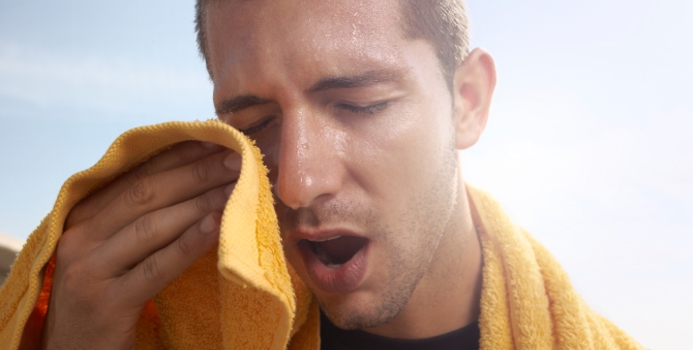Read all about Diaphoresis symptoms, Causes , Treatment, Prevention.
Everyone sweats. Your body sweats to chill you off when you are overheated. In any case, there is a point that sweating is no more helpful, rather harmful. Have you ever found yourself so damp with sweat that you were drenched and soaked fully? If you’ve invested much energy outside on a hot summer day, it’s presumable that you have. Be that as it may, have you ever sweat to overabundance on different events? On the other hand would you say you were not able quit sweating once you’d tried cooling yourself? Provided that this is true, you may have been experiencing a medical condition.
Diaphoresis is not the light dew it’s heavy-duty perspiration. Individuals who have diaphoresis might regularly trickle sweat and wipe moisture from their hands and face. While there are no health ramifications to sweating a lot, it can be uncomfortable and embarrassing. It’s indication that something wrong is going in your body. It might be heartening to realize that overwhelming sweating is presumably harmless; however that wouldn’t mean you may experience life wiping your face with a towel. Luckily, there’re approaches to address the disorder; some may deal with at home, while others may require a physician’s help.
What is Diaphoresis Definition?
Perspiration, particularly when copious and medically induced is known as diaphoresis. Diaphoresis is excessive sweating, or sweating so much that you are soaked. It is considered as a medicinal condition as it doesn’t rectify itself after a period when it must have stopped. It goes beyond normal sweating because of its large amounts.
Diaphoresis and Hyperhidrosis
Another medical condition involving excessive sweating, called hyperhidrosis, must not be viewed as the same as diaphoresis, in spite of the fact that they are similar. Hyperhidrosis is the most well-known reason behind exorbitant sweating, yet it is because of an overactive sympathetic nervous system, which makes it not quite the same as diaphoresis.
Hyperhidrosis relates to sweating too much and unpredictably, usually as a consequence of overactive sweat glands. Diaphoresis is brought on by different underlying medical conditions and for the most part requires medical attention to treat it. Nonetheless, settling it requires knowing the particular cause.
Diaphoresis symptoms, Causes, Treatment, Prevention
Let’s review about Diaphoresis symptoms, Causes, Treatment, Prevention
Diaphoresis symptoms
Diaphoresis is indicated as:
- Progressive weakness and sleepiness
- Vasovagal syncope
- Abdominal pain and tenderness
- Nausea
- Fever
- Headache
- Fatigue
- Agitation
- Insomnia
- Palpitations
- Weight loss
- Runny nose
- Chest pain
- Shortness of breaths
- High breathing rate
- High heart rate
- Muscle cramps
Diaphoresis Causes
The physiological causes of diaphoresis are:
- Menopause
- Puberty
- Strenuous activity or physical exertion
- Fever
- Eating spicy foods
- High environmental temperature
- Emotional disturbances (fear, anxiety, etc.)
- Remembrance of any past trauma
- Hormonal changes
Pathological causes of diaphoresis consist of:
- Hyperthyroidism
- Shock
- Diabetes
- Myocardial Infarction (heart attack)
- Malaria
- Tuberculosis
- Neuroleptic malignant syndromes
- Alcoholism
- Heart failure
- Obesity
- Lymphoma
- Pregnancy
- Rheumatoid arthritis
- Stroke
- Cancers
- Hypoglycemia
- Allergic reactions
- Infections
- Hypopituitarism
Diaphoresis Treatment
Individuals need to increase their fluid and salt intake when they have excessive sweating. The liquid and salt should be given through a tube in the veins in extreme cases or if persons can’t drink fluids all alone. Different medications are coordinated at the reason for the sweating.
Treatment may includes
- Antibiotic- Persons with infections may need antibiotics.
- Persons with high thyroid hormone levels may require prescription to control their thyroid levels.
- Persons with tumors may require surgery, chemotherapy, or radiation treatment.
- Persons who have had a stroke may require physical therapy to have the capacity to walk or talk again.
- Fluids by mouth or intravenous infusion to avoid dehydration
- In delayed, extreme diaphoresis, electrolytes, essentially sodium is given
- Treating the particular underlying disease
- Ceasing certain medications, if necessary
- Preventing strenuous exercises
- keeping surroundings cool
Diaphoresis Prevention
Prevention is related to the cause.. For instance, excessive sweating because of activity or hot climate can be maintained a strategic distance from by keeping away from activity or using air conditioners. Low glucose can regularly be maintained a strategic distance from by sufficiently motivating to eat and taking medications to treat diabetes.
Excessive sweating can prompt lack of hydration and electrolyte imbalances in the body. Other long haul impacts are related with the underlying medical cause. For instance, a stroke can leave a man paralyzed or not able to talk. Infections regularly go away on their own or after treatment with antibiotic medicines and may have no long term impacts.
Only your specialist can advise whether any of these medications are suitable for your particular medical situation. Always talk about all treatment options with your specialist before settling on a choice, including whether to begin or end any treatment plan.
 Health & Care Information
Health & Care Information 


